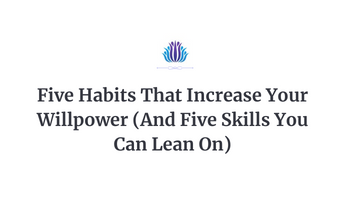What is the most powerful word in the English Dictionary? No.
Seriously.
If you want to create a healthy body – most of the time it boils down to saying “no” to sweets, treats and alcohol.
If you want to create wealth, your greatest task is to learn how to say “no” to purchases that you don’t actually need.
What about peace of mind? It distills down to your capacity to say “no” to events and commitments when you really need some time to yourself.
Because in the end…saying “no” to these things is really about saying “yes” to yourself. As a colleague of mine once said – “If you never learn how to say NO, your YES means nothing.”
The problem is that saying “no” requires a certain level of discipline. We are constantly bombarded with temptation offered by marketing specialists who are very good at getting a yes.
So how do we cultivate discipline? Basically, it boils down to a combination of both Will and Skill.
Cultivating Willpower
Question: Would you rather eat a treat right now? Or would you prefer to wait for 20 minutes and eat two? That was the question posed to children nearly 40 years ago. Those who answered the latter were tracked over time. They tended to have better relationships, more fulfilling careers, and greater wealth. Why? Because they showed, at an early age, an ability to delay gratification. Otherwise known as willpower.
But…does that mean we our capacity for success in life is predetermined? Not really. According to a number of health researchers, including health psychologist Kellly McGonigal, we can learn how to cultivate more willpower with these habits:
- Meditation: as little as 5 minute per day of meditation is enough to help boost willpower over time. It doesn’t have to be fancy brainwork either. Some of the most effective strategies included simply watching the breath for five minutes.
- Want to start a meditation practice, but don’t know where to start? The App “Headspace” is an excellent tool to help you develop a meditation practice without the muss and fuss of complicated instructions.
- Sleep: Arriana Huffington wasn’t just sweet talking us when she told us to sleep our way to the top. Getting enough sleep is linked with better levels of productivity and it can directly improve our capacity for willpower.
- Exercise: When we move our bodies, endorphins kick in and our ability to focus dramatically improves. So if you find yourself feeling overwhelmed…walk it off. Its not advice just for olympians.
- Cultivate Greater Awareness: Want to know something interesting? If you walk into a shopping mall and smell food, you’re more likely to impulse buy. That’s because your prefrontal cortex (which is already having to steer clear of food – thus tapping our willpower muscle). Because our brain is already a little fatigued by the strain of keeping away from the food, we are more likely to justify impulse purchases. BUT – those people who were made aware of the fact that shopping malls use that as a strategy were FAR less likely to succumb to it. As McGonigal says “now, you’re in on the joke! So you’re not likely to be a victim to it.
- Start Small: Willpower is a lot like a muscle. If you want to build on it – it’s best to start with something easy. For example – if you want to start saving money, but you really struggle with saying “no” – start with something easy like “I will make a point not to buy coffee out” instead of “I am now going to reduce my spending by 50 percent!”
Want more information? Take a look at Kellly McGonigal’s interview about her book: The Willpower Instinct.
But it’s not just about cultivating more willpower. Since willpower is a bit like a muscle (which means it can get fatigued) – it’s also about learning how not to overtax your willpower muscle. You don’t do that with willpower. You do it with SKILLpower.
In their book Living Smart: Five Essential Skills to Change Your Health Habits Forever, Sherri Pruitt and Joshua Kaplow managed to take a mass of research on how successful people sustain challenging behavior changes (changes that lead to greater health, wealth, and overall success) and distill it into five skills.
S – Set a Goal: Set a specific, measurable, observable goal. In other words…don’t say “I am going to spend less money this month. Don’t say “I’m going to lose two pounds this week.” Say, instead, “I am going to make it a goal to NOT buy coffee out in restaurants and only drink it from home.” Or “I am going to set a goal to exercise 20 minutes at least 3 days during the week. Specific, actionable goals are more likely to be successful because you know when you have achieved it. Vague goals like ” I will eat less” don’t work. Eat less? Less than what? Less than whom? So to set a goal correctly, make sure it passes this test:
- Is it an actual action that I can have DIRECT impact on? Setting a goal to “lose weight” isn’t an action. That’s a result. You can directly impact how much you exercise or whether or not you eat veggies. You cannot directly make the scale say what you want.
- Is it something you could measure?
- Is it specific? Vague goals like “eat less” or “move more” aren’t specific enough. You won’t really know when you have achieved it. Be VERY clear about how much you are going to do.
- Is it doable/reasonable? Saying you’re going to go from no exercise to 60 minutes of running each day is probably not reasonable. But 20 minutes, three times per week? Maybe!
- Is it time-bound? Make sure you know when the end-time is. Don’t just say “exercise for 20 minutes. Be sure to include how many days during the week and for how many weeks.
M- Monitor Your Progress. Whether you want to save money or lose weight, the power of monitoring your progress along the way is HUGE. This is why pedometers and movement trackers have become so powerful. It gives you an ability to see how you are progressing. Paul Smalera, in his article The Data Diet illustrated this beautifully by showing how he was able to lose 60 pounds by tracking his weight more vigilantly.
A – Arrange Your World. If you decided you wanted to make a point not to drink coffee out…it’s probably important to be sure that you have coffee beans at home to be able to roast. If you don’t have any at home…now you’re just without coffee altogether. And that’s not good for anyone. If you want to start an exercise program…make sure you have your fitness clothes out and ready to go. You don’t want to be looking for them when you are already pressed for time.
R – Recruit Support. Making behavior change is hard. And it’s made significantly harder if you don’t have support from those around you. If you want to be successful at making a change, you’re 57 percent more likely to be successful if others are doing it with you. If you can’t find that, at the very least…you are more likely to be successful if you have people supporting you. Henry Cloud covers this beautifully in his book The Power of the Other.
T – Treat Yourself. That’s right…if you want to make a habit stick, you have to have built-in rewards for your behavior. So every time you choose NOT to have coffee, what can you gift yourself with instead? If you are making a point not to spend as much money – what are rewards that you can think of that don’t require a large expense of cash? A walk outside? A ten minute break? Some time on your favorite app? A conversation with a friend? As Charles Duhigg in his book: The Power of Habit reports…if you want to change your behavior, determine the cue for your current behavior. Determine what action you’re taking. Then determine what rewards you gleam from it. For example, if you are currently going out for coffee every day, maybe the cue is your 10am break. The action is coffee at the shop. The reward is a walk outside, a break from your office, and some time chatting with the folks at the shop. How can you gleam some of the same rewards (connection with others, a break from work, a walk) without the coffee?
Conclusion: Basically this boils down to two things. First – if you want to make a change in your behavior, it will take a bit of willpower. If you feel like you have none there are strategies you can utilize to cultivate more. Just like a savings account, you can learn how to deposit more reserves. BUT – just as with a savings account – one of the best ways you can assure you keep what willpower you already have intact is to learn how not to tax it all the time by learning to use SMART skills.

